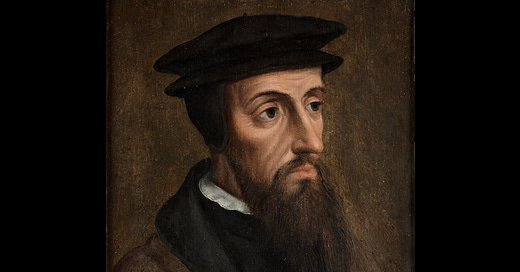First, a Little History
John Calvin (1509-1564) was a French theologian and pastor who spent most of his ministry in Geneva, Switzerland. Calvin was a major influence during the Protestant Reformations across Europe, preaching and teaching with the fervor of a man who seemed wholly devoted to Christ. His pastoral strategies and activities in Geneva set something of a gold standard for Protestant pastoral ministry (a great historical work on this subject is Calvin’s Company of Pastors by Scott Manetsch).
Calvin preached and taught expositionally through the Bible, leaving behind many commentaries on the biblical text and other insightful books on Christian belief and practice. However, Calvin's most notable work is known as Institutes of the Christian Religion, which is a magnificent theological treatise. Systematic theology texts are quite numerous today, but before Calvin, such a thing was exceedingly rare.
Calvin's writings create a bit of difficulty for anyone to answer my main question here (What is Calvinism?) since his Institutes alone clearly demonstrate that Calvin's theological system and contributions were much more expansive than many Christians suppose today. However, I am going to avoid the worthwhile debate about who is and is not a real Calvinist.
Rather, I am going to focus my answer to the main question (What is Calvinism?) on the popular or common interest behind this question. Most people who claim to be Calvinists today are merely announcing their affirmation of the so-called Five Points of Calvinism, and many modern-day Calvinists don't even affirm all five.
Five Points of Calvinism?
Ironically, Calvin never articulated these five points of doctrine in such an arrangement. The five points popularly known as Calvinism today were not even a bulleted theological structure until after the Remonstrance (a group of the followers of Jacobus Arminius who remonstrated at the Synod of Dort in 1618-19) made these points the focus of their opposition. The synod was 50 years after Calvin died. Even at that time, however, these five affirmations were not arranged as the popular acronym TULIP. That didn't happen until at least 200 years later.
At the Synod of Dort, the Remonstrance petitioned the government for an allowance to hold their theological view. Throughout history religion and government have been joined more often than not, and this minority religious group needed a civil dispensation to practice what they preached. A similar doctrinal position, called Semi-Pelagiansism, had already been condemned one thousand years earlier (in AD 431 at the Council of Ephesus and again in AD 529 at the Council of Orange), and the Remonstrance wanted to avoid the same designation.
But, alas, the followers of Arminius were condemned just the same as the Semi-Pelagians before them. The Synod of Dort ended with a judgment against Arminianism, declaring it a heresy alongside Semi-Pelagianism. The synod produced several canons (or doctrinal affirmations), some of which became the origins of the so-called Five Points of Calvinism.
The Five Points:
1) Total Depravity: Fallen humans, since Adam, are thoroughly affected by sin – their bodies, minds, and wills/desires; and unregenerate people are incapable of naturally doing anything genuinely good (Rom. 3:10-18).
2) Unconditional Election: God elects some sinners unto salvation, whereby they become beneficiaries of God’s blessings, not because of any condition in them, but according to the riches of God’s gracious grace and according to the purposes of His divine will (Eph. 1:3-6).
3) Limited Atonement: Jesus Christ’s atoning work on the cross is priceless, sufficient to cover all sin and all sinners, but Christ’s atoning work was intended and effectual only for those who believe and not for anyone else (Jn. 10:14-16).
4) Irresistible Grace: God alone causes sinners to be born again (regeneration is a monergistic act), through the proclamation of the gospel and powerful work of His Holy Spirit (God normally uses means). All who are born again possess new hearts with which they respond in loving affection for God, believing and repenting by His grace (Eph. 2:1-10).
5) Perseverance of the Saints: All sinners whom God has elected unto Himself, those for whom Christ has died, those God has made spiritually alive, will pursue personal holiness in this life and will persevere to the end (Rom. 8:28-39).
Common Conversations Today
Calvinism (as simplistically articulated in the five points above) has been the majority view among Protestants. Historically, Baptists, Presbyterians, Congregationalists, and Anglicans have all affirmed these doctrines. Notable twenty-first-century theologians and pastors who affirm these doctrines include R.C. Sproul, Ligon Duncan, Albert Mohler, and Mark Dever.
This brief article is only intended as a very simple introduction to these theological affirmations. I suggest further investigation for the interested Christian, and numerous books and articles might be a help.
In my estimation, Wayne Grudem's book, Systematic Theology, does a good job of explaining the various views of biblical salvation. This would be a good starting point for further study.
Whether you embrace this view or not, all believers must look to the Bible as the ultimate authority. It is also important that we humbly and graciously investigate the Bible alongside our brothers and sisters in Christ. Our disagreements may be important, but so is our love and charity.



